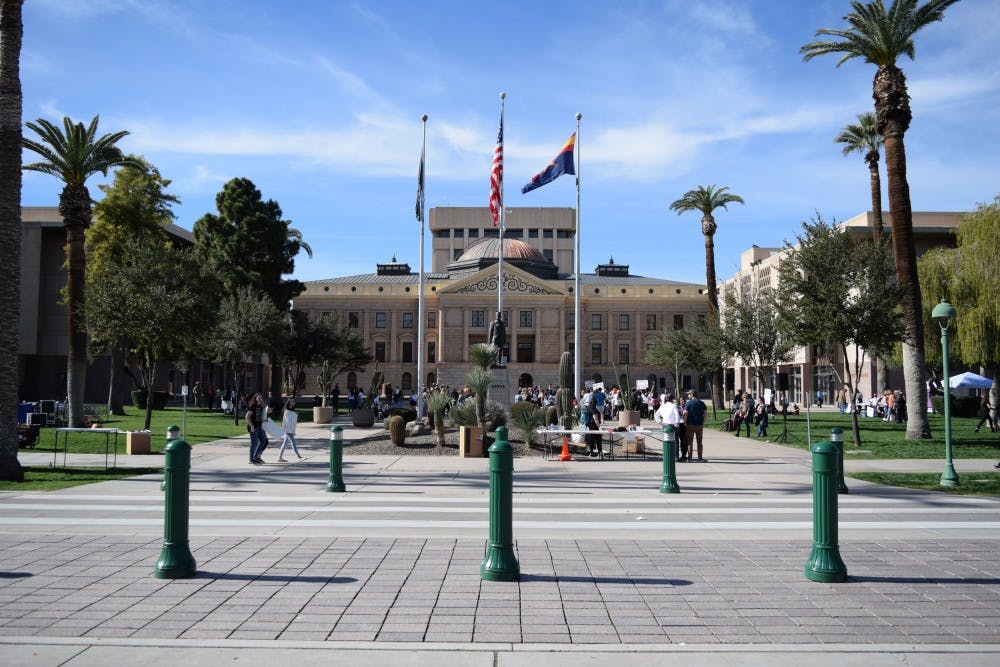While a large portion of Arizona's K-12 students rely on financial aid to attend higher education, many types of aid still go unclaimed.
But solving this problem is one of the key goals of the Arizona Commission of Postsecondary Education, the state's main governmental agency in increasing access to financial aid.
The ACPE is meant to increase student financial assistance and “identify and implement strategies to help students and families plan, enter and succeed in postsecondary education," according to the commission's website.
There have been discussions recently over the viability of the commission and concerns regarding some of its practices, but officials on the commission say the ACPE unifies different forms of education.
"The Arizona Commission is the single place in state government where private and public higher education come together," ACPE Executive Director April Osborn said during a sunset review of the commission.
The Arizona State House of Representatives Education Committee held the sunset review of the commission on Jan. 16, where the committee voted unanimously to continue the ACPE.
The goal of the sunset review was to present the findings of the Arizona Office of the Auditor General who evaluated the commission and then give ACPE the chance to respond to the findings and speak on the work that it does.
Osborn explained in her presentation that the commission provides financial aid through LEAP grants, the Arizona Teacher Student Loan Program and through the Arizona Family College Savings Program, also known as "529" plans.
A 529 plan allows families to save money for educational expenses in a tax-deferred savings account. ACPE said that there are 81,000 such accounts in Arizona and that they collectively have $1.3 billion saved.
Oversight of the 529 program was one of the concerns of the auditor general's office, whose presentation was given by Performance Audit Manager Cheya Wilson.
Wilson said that concerns in regard to the oversight of the 529 program were based on how the commission dealt with the three providers of 529 plans.
The office's report said that the commission evaluates the providers during annual performance reviews but uses a scale from one to five that does not have clearly defined criteria.
The report also said that the ACPE failed to acquire all the information needed to evaluate the providers and did not review the payments required by the providers to ensure the commission was paid the correct amounts.
The commission has already started to implement the recommendations of auditor general, Wilson said.
During the audit, the commission took action to review the payments made by the providers. Wilson recommended on behalf of the auditor general's office that the commission continue to review payments, as well as clearly define the criteria that will be used in future performance reviews.
The other finding of the auditor general was that the commission needed to take steps to better protect confidential and sensitive information.
ACPE has information on financial aid applicants, Free Application for Federal Student Aid applicants and 529 program participants. This information includes birthdates, Social Security numbers and account numbers.
The report said that this information was protected from external threats, but that greater caution needed to be taken with internal threats by limiting the amount of access employees have to the information and making sure the commission’s IT contracts include a timeline regarding when access should be cut off to employees no longer working at the ACPE. The last recommendations responds to a case in which a former employee still had access to sensitive information after ceasing work with the commission.
Susan Ciardullo, a chairperson for ACPE, said during her public testimony at the review hearing that only six staff members have the ability to access sensitive information and that they do not abuse the power.
"When they say the whole staff can have passwords, there’s only six of them working for Dr. Osborn, and every single one of them is an all-star and a true professional," she said to the committee. "I have every confidence they’ve kept that data safe."
After responding to the report's findings, the ACPE explained the initiatives they are currently working on, which include encouraging high school students to complete college applications and helping them and their families apply for financial aid through FAFSA workshops.
Fred Lockhart, executive director of the Arizona Private School Association, testified in support of the ACPE with a similar point that the commission allows all sources of education to discuss new initiatives to benefit all students.
"We can all be there — private, public, charter, K-12, everyone — for the common goal of trying to lift all those in Arizona with higher education," Lockhart said.




